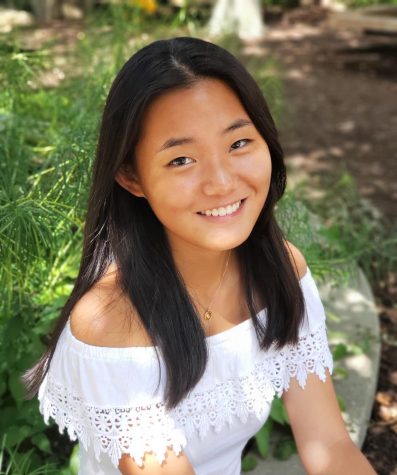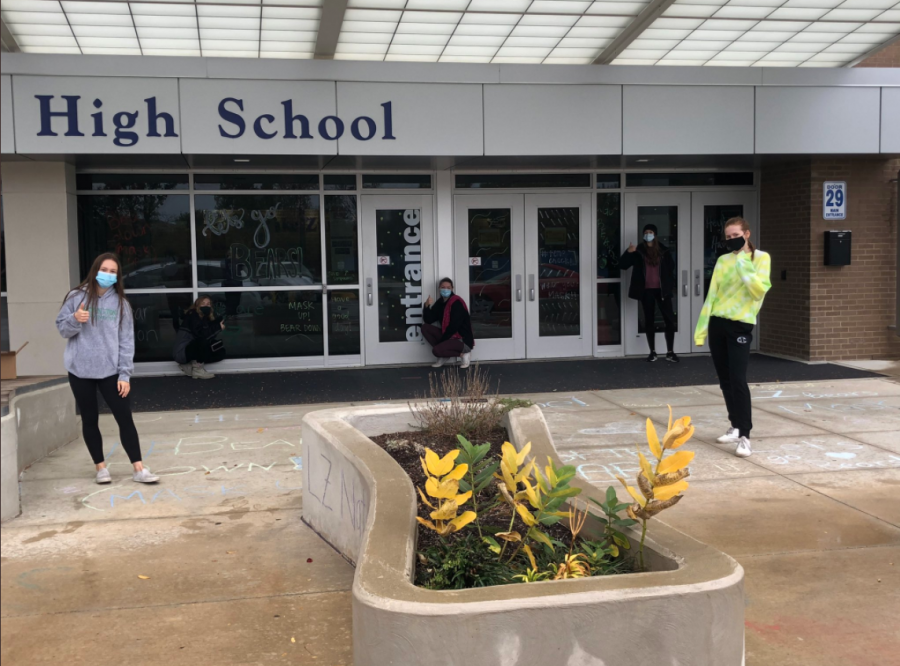Not exactly a student “government” — but for a reason
A closer look at the past and present structure of LZ’s Student Council
Photo by and used with permission of @LZHSStudCo
Student council members spreading school spirit to welcome students back to in-person learning in October. Although they are not as involved in policy-making, Madeleine Lawler, senior Student Council member, says that the club plays a crucial role in keeping the school unified.
After a polarized election week, ballots have been counted and a new US president projected at last. But for many students, government is still a vague, faraway concept that they cannot participate in yet (save for a few seniors). That does not mean that aspects of government do not appear within high schools, though. While far less political, there is one well-known club at LZ that serves to represent the student body: Student Council.
However, with members chosen by sponsors and officers, officers elected within the club, and “less school-policy decision-making than school spirit planning,” according to Madeleine Lawler, senior Student Council member, LZ’s Student Council is not quite a student government.
But there’s a reason for that, says Christopher Bennett, former sponsor of Student Council for 24 years, who points to the extensive history of changes that the club has undergone.
“We tried to become more political for a while and have Student Council [be more involved] in policy change, with surveys and suggestion boxes, but what we found is that there were a whole lot of things that people just kind of shrugged their shoulders about and might not have agreed with, but weren’t really upset about enough to the point change,” Bennett said. “So instead, we just said, ‘we’re just going to work on trying to make the environment of Lake Zurich High School the best environment it can be for the students’ and focused on spirit events like Charity Bash and assemblies and Homecoming week and girls’ football.”
These events, now annual traditions embraced schoolwide, would never have taken off or succeeded with the old election structure of Student Council, says Bennett.
“My first year taking over as sponsor, we used to choose representatives by election,” Bennett recalls. “[Grade by grade], we would bring all of the students into the cafeteria and they would listen to actual speeches that kids who wanted to be on Student Council would give, and quite frankly, it was a joke. It was literally like watching one of those high school movies where somebody would stand up, yell ‘football!’, and everyone would go ‘yeah!’ and vote for him. It was just a popularity contest. And because we had all these people who just wanted to walk around saying ‘I’m a leader’ and didn’t really want to try to make the school a better place or do new activities, we couldn’t get anything done.”
With a new application process for representatives, Student Council was able to jump-start many of the spirited school events LZ boasts today. But while drastic change was made to the structure of the club, some things stayed the same — at least for a few more years.
“We still had our officer elections at an assembly, but the student body really didn’t care who the officers were,” Bennett said. “It wasn’t something where they actually analyzed the candidates to figure out who would do the best job, everybody would just vote for their friends and that was that. So we figured that it would make more sense if the Student Council representatives were the ones that actually chose the most involved of their own members to be the officers. And that’s the system we’ve had ever since.”
Although today’s Student Council has found its tried-and-true role as a club that manages the school’s biggest annual events and school spirit activities, rather than a governmental unit, there is one lesser-known group that does help administrators make decisions.
“Mr. Rubenstein coordinates the advisory council, which is a group of students that meet on a monthly basis to discuss student issues,” Bennett said. “They sit down and have lunch and [ talk about] what’s going on around school and what people want to change. They were the ones who helped design Studio C, who brought in the idea and brainstormed what kids want to see there. And they’re kind of just regular kids that he gets by randomly asking some teachers to give him a name, somebody that is involved in the school but not necessarily the Student Council president or the NHS president or the baseball team captain.”
While this random selection of advisory council members is beneficial in getting “differing opinions, different philosophies, [and] different viewpoints,” according to Bennett, students like Lawler, who were not around for the periods of change that Student Council went through, are more disappointed that they do not have much say on school policies.
“My mom was Student Council president when she was in high school and she always talked about all the changes she made to make the school more equal, and I joined because I wanted to do something like that,” Lawler said. “I thought I was going to get to share my ideas more and give more input on the structure of everything, and I wish that there was a student-government-type organization that was accessible to everyone, in case you had something important you wanted to bring up.”
Although Lawler says she would like to see an organization with more decision-making impact than Student Council, she also believes that the club as it is today has achieved some “pretty amazing things.”
But more important than the structure of clubs or the method used for election is the mindset that students learn during high school, says Lawler. “Most of us can’t vote yet and we can’t go around solving issues on our own, but we can learn to be critical-thinkers who [understand and engage] with the world around us.”

As a senior, Caroline's back for her third year as Digital EIC. If you ever catch her outside of school, she'll probably be running with the cross country...

